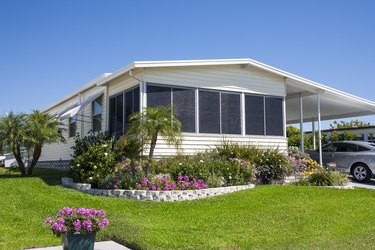
Mobile homes, also known as trailer houses, are likely to have problems in hurricane winds. It all depends on wind strength; hurricane-force wind speeds of 74 mph and above can damage or destroy a mobile home. You can take precautions to tie down and secure an older mobile home against high winds and other natural forces. In addition, if a mobile home is attached to a traditional foundation, it stands a better chance of surviving the destructive winds should a hurricane hit.
Mobile Home Construction
Video of the Day
Mobile homes were manufactured prior to June 15, 1976. Construction of mobile homes was totally different from that of traditional "stick-built" houses and modern manufactured homes. A steel frame upon which a subfloor was attached was the first element of construction. After that, walls of varying thickness were erected, and then the roof.
Video of the Day
Finishing work, such as the wiring, plumbing, painting, carpeting, and appliance installation, occurred last. Then the mobile home was towed to its location in a trailer park or on private land. While sturdy to a point, an older mobile home is often supported by the original trailer frame and a few foundation piers, concrete blocks or other supports. It can, with significant effort and expense, be moved to a new location if necessary.
Manufactured homes are not the same as mobile homes. They are constructed in a factory and transported to the site, but there the similarities end. A manufactured home is built to current housing standards and permanently attached to a foundation.
Foundations for Mobile Homes
Hurricane winds can wreak havoc on mobile homes. That's because there's no foundation, in the traditional sense, anchoring the homes to the ground. Instead, there are only the wheels and a set of stabilizing cinder blocks underneath the floor framing and trailer frame, which are usually hidden behind a decorative skirting that hides it all away from view. Fortunately, it's possible to anchor a mobile home's frame to the ground.
Tie-Downs for Mobile Homes
All mobile homes have the ability to be strapped and anchored to the ground with tie-downs. While not as strong as traditional foundations, adding metal strapping through the frame and then anchoring the straps into the ground can help. These straps and tie-downs work by fortifying and strengthening a mobile home's overall structure. That will keep it, to a point, from excessively flexing and even flying away during a hurricane.
Hurricane-Force Wind Warning
By their nature, mobile homes are less able than traditional homes to withstand the effects of hurricane winds, with Category One wind speeds beginning at 74 mph. A mobile home's long, broad sides act as sails, catching the wind and then sometimes flexing greatly in response. This can quickly damage a mobile home unless it's properly stabilized and strengthened according to current building codes.
The strongest hurricanes, with Category Five winds exceeding 154 mph, will quickly destroy most mobile homes, regardless of any safety improvements. In addition, surrounding trees and other structures, such as carports and neighboring buildings, can damage even a well-secured mobile home when the hurricane-force winds hit the community.